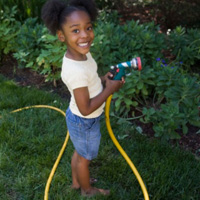 You know the drill. From the moment the alarm clock sounds, you’re rushing at warp speed. Get up. Get the kids up. Grab a shower. Get the kids ready for school. Rifle through the cupboards for a cereal breakfast. Scoop the car keys. Grab the kids’ sack lunches, backpacks, homework, and you’re out the door. Whew! Before you’ve even begun the day, you’re frazzled, disconnected, and out of sync. Were we meant to live like this? Dr. Eva Shaw, Ph. D. author of Shovel It: Nature’s Health Plan, doesn’t think so.
You know the drill. From the moment the alarm clock sounds, you’re rushing at warp speed. Get up. Get the kids up. Grab a shower. Get the kids ready for school. Rifle through the cupboards for a cereal breakfast. Scoop the car keys. Grab the kids’ sack lunches, backpacks, homework, and you’re out the door. Whew! Before you’ve even begun the day, you’re frazzled, disconnected, and out of sync. Were we meant to live like this? Dr. Eva Shaw, Ph. D. author of Shovel It: Nature’s Health Plan, doesn’t think so.
Blame our breakneck pace on the Industrial Revolution, the need for a two-income household or just the velocity of modern times. Wherever the blame lies, sometimes it can seem like we need a dose of therapy just to cope. But before you send your fingers walking through the yellow pages for a psychologist or group therapist, take a look at your thumb. Even if it’s not green, you can benefit from a bit of garden therapy.
Have you ever noticed that gardeners almost always seem happy, healthy, and generous? Shaw has. A petite southern California gardener whose smile radiates warmth like a sun-drenched day, she came to this conclusion while researching her book What to Do When a Loved One Dies (Dickens Press). People who scraped in the soil and worked a garden, she discovered, recovered from grief faster than those who didn’t.
“If gardening or being with nature can help people [who have lost a loved one] cope, it follows it helps with lesser stresses,” Shaw explains. She dug in.
A gardener since she made her first mud pie (always garnished with geranium flowers, she jokes), Shaw says she realized that she too had reaped the benefits of gardening in her life. “Wherever I’ve lived, I’ve scratched, shoveled, dug and prayed over the soil…” she explains. “Rarely did I give a thought to the healthy, happy conditions I had created in my own life and the lives of others, who shared my bountiful harvests.”
But Shaw knew there was more to it than a few pretty posies. With an unquenchable curiosity she plowed through mounds of research. What she found came as no surprise. Not only is gardening enjoyable, but it’s good for you too. Calling us “hard wired” to seek nature–especially during times of stress–Shaw explains she uncovered research that showed gardeners had the same brain wave patterns as people who meditate. Pointing to a Swedish medical study, Shaw says researchers concluded that post operative heart patients who were given a garden picture to enjoy recovered from surgery faster than other patients. And an English study, Shaw explains, showed that children who are exposed to dirt have less health troubles with asthma.
And if she hadn’t already known gardening was good for people, it soon became apparent as she watched the tragedy of September 11 unfold. “I could barely swallow,” Shaw says. As American icons collapsed into a smoldering heap and tear stained images of torn families, lost children, and vanished friends filled their place, it was more than she could bear. “I went out into the garden to find some solace,” she says. Before she knew it, weeds were uprooted, unruly vines hacked away and a transformation begun. “It didn’t make it [the attack on New York] go away,” Shaw admits. But it did help her cope.
In addition to its mental benefits, Shaw says gardening helps counteract the physical harms of stresses–such as the ones nearly every American felt following the September 11 tragedy. “When the body is stressed, it’s building stress hormones.” Those hormones build up, Shaw explains. As adrenaline surges we feel jittery, paranoid, and lose a sense of well-being. But gardening, she insists, relieves stresses (big and small).
You don’t have to have a green thumb to reap the benefits of gardening. Start small. Take a trip to your local plant nursery and pick out an inexpensive houseplant. Buy a gardening book or magazine to learn more about gardening. (You might also want to clip magazine pictures and stick them to your refrigerator or bulletin board for inspiration.) If you don’t have a place to garden, consider mowing the lawn of an elderly church member. You’ll both gain.
Think the therapy is over once you’ve got the perfect veggie or flower garden? Think again. Nothing brings a smile to someone’s face or makes you feel as good as sharing the bounty. “I’ve never had someone turn down a bouquet of flowers,” Shaw says with a grin. And who can resist a basket of sun-ripened cherry tomatoes?
“All gardens should have a place for you to sit, pray, dream, think, unwind and nourish your spirit and your body,” Shaw says. But even if you don’t have the room, time, or strength and stamina for a garden, Shaw says not to sweat it. “Visit public gardens and take garden tours,” she says. “Any garden can be therapeutic if you have a place to sit.” Taking the time to enjoy nature, Shaw explains, can help us cope with everyday stresses–such as the morning alarm clock.






